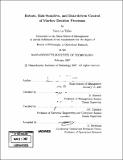Robust, risk-sensitive, and data-driven control of Markov Decision Processes
Author(s)
Le Tallec, Yann
DownloadFull printable version (10.05Mb)
Other Contributors
Massachusetts Institute of Technology. Operations Research Center.
Advisor
D. Simester and J.N. Tsitsiklis.
Terms of use
Metadata
Show full item recordAbstract
Markov Decision Processes (MDPs) model problems of sequential decision-making under uncertainty. They have been studied and applied extensively. Nonetheless, there are two major barriers that still hinder the applicability of MDPs to many more practical decision making problems: * The decision maker is often lacking a reliable MDP model. Since the results obtained by dynamic programming are sensitive to the assumed MDP model, their relevance is challenged by model uncertainty. * The structural and computational results of dynamic programming (which deals with expected performance) have been extended with only limited success to accommodate risk-sensitive decision makers. In this thesis, we investigate two ways of dealing with uncertain MDPs and we develop a new connection between robust control of uncertain MDPs and risk-sensitive control of dynamical systems. The first approach assumes a model of model uncertainty and formulates the control of uncertain MDPs as a problem of decision-making under (model) uncertainty. We establish that most formulations are at least NP-hard and thus suffer from the "'curse of uncertainty." The worst-case control of MDPs with rectangular uncertainty sets is equivalent to a zero-sum game between the controller and nature. (cont.) The structural and computational results for such games make this formulation appealing. By adding a penalty for unlikely parameters, we extend the formulation of worst-case control of uncertain MDPs and mitigate its conservativeness. We show a duality between the penalized worst-case control of uncertain MDPs with rectangular uncertainty and the minimization of a Markovian dynamically consistent convex risk measure of the sample cost. This notion of risk has desirable properties for multi-period decision making, including a new Markovian property that we introduce and motivate. This Markovian property is critical in establishing the equivalence between minimizing some risk measure of the sample cost and solving a certain zero-sum Markov game between the decision maker and nature, and to tackling infinite-horizon problems. An alternative approach to dealing with uncertain MDPs, which avoids the curse of uncertainty, is to exploit directly observational data. Specifically, we estimate the expected performance of any given policy (and its gradient with respect to certain policy parameters) from a training set comprising observed trajectories sampled under a known policy. (cont.) We propose new value (and value gradient) estimators that are unbiased and have low training set to training set variance. We expect our approach to outperform competing approaches when there are few system observations compared to the underlying MDP size, as indicated by numerical experiments.
Description
Thesis (Ph. D.)--Massachusetts Institute of Technology, Sloan School of Management, Operations Research Center, 2007. Includes bibliographical references (p. 201-211).
Date issued
2007Department
Massachusetts Institute of Technology. Operations Research Center; Sloan School of ManagementPublisher
Massachusetts Institute of Technology
Keywords
Operations Research Center.